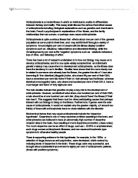Discuss the influences of childhood on adult relationships
Many psychologists would agree that childhood experiences can shape later adult relationships. One researcher that studied this was Shaver. They claimed that our infant relationships shape our adult relationships in 3 ways; attachment, caregiving and sexuality. Attachment suggests that later relationships are a continuation of early attachment types, with possible attachment disorders forming. Through caregiving, our knowledge of caring is learnt by modelling the behaviour of our primary care giver. And the sexuality system is learnt, e.g. avoidant attachment styles are more likely to view sex without love as pleasurable.
Hazen and Shaver tested ‘is love in adulthood directly related to attachment type as a child?’ they conducted a love quiz. Participants based their answers using experiences from previous love relationships and infant care attachments. They found that 64% had a secure attachment, and that childhood experiences within their family will repeat in their adult lives.
However this theory can be criticised for being reductionist as it doesn’t factor social or cultural influences in later life that may lead to adapting and improving on any childhood deficits. The theory states that our early experiences set in stone our later ones, but this is not the case as it’s far more complex than this, shaped by more than just attachment styles. As we have free will, this allows us to break away from early experiences through conscious thought, allowing us to address the problem areas in our lives. Due to this, the theory is deterministic, it assumes that our fate is sealed from childhood experiences but really we learn from these experiences and can change our behaviour so our attachment styles may actually change over time.








